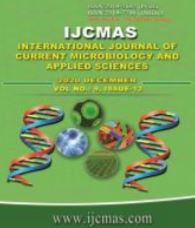


 National Academy of Agricultural Sciences (NAAS)
National Academy of Agricultural Sciences (NAAS)

|
PRINT ISSN : 2319-7692
Online ISSN : 2319-7706 Issues : 12 per year Publisher : Excellent Publishers Email : editorijcmas@gmail.com / submit@ijcmas.com Editor-in-chief: Dr.M.Prakash Index Copernicus ICV 2018: 95.39 NAAS RATING 2020: 5.38 |
An alarming challenge of environmental pollution in today’s world has been increasing ever since man has come to know about the ways of exploiting the mother earth leading to irreparable damage. A considerable mismatch between the ever-increasing use of plastics and their proper waste management has raised questions about the sustainability of environment and its safety. Polymer degradation is given importance to reduce the ponderance of plastic in the environment through physical, chemical and microbial methods over various disposal methods because of their superior efficiency. With respect to the potentiality of microbial communities to biologically convert certain plastic polymers into simpler and safer products, current understanding for characterizing new microbial strains and their mechanisms to degrade fossil- based polymers play deciding factor to ensure environmental safety. This review summarizes current knowledge on different types of plastics from which microbial community can derive their nutrition through bioremediation process by using enzyme or non-enzyme based high molecular weight plastic degradation. It has also covered the major concerns about the natural and synthetic polymers, their types, uses, problems associated with their accumulation and factors affecting their biodegradability through bioremediation. It has looked at the disposal methods and the standard methods used in assessing the extent of polymer degradation. Biodegradability tests of synthetic polymers are important parameters to judge the degradability of a particular polymer and its associated negative impact environment so that an alternative method to combat this problem of accumulation of plastic materials can be established. Irrespective of the mechanism underlying the degradation process, global metagenomes of non- cultivated microorganisms and unexplored proteins should be taken as future studies.
 |
 |
 |
 |
 |